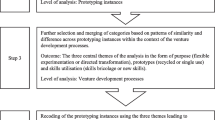Abstract
Israel M. Kirzner is the 2006 winner of The International Award for Entrepreneurship and Small Business Research (the FSF-Nutek Award). In this Prize Lecture he argues that a number of those who have commented on his work have misunderstood certain aspects of his theoretical system, and as a result the common distinction in the literature between “Schumpeterian” and “Kirznerian” entrepreneurs is flawed. He also argues that his understanding of the market process (set in motion by entrepreneurial decisions) provides a theoretical underpinning for public policy vis-à-vis entrepreneurship. Professor Kirzner’s main contributions to the economics of entrepreneurship were also presented and evaluated by Douhan et al. [Small Business Economics 29(1–2):213–223, 2007].
Similar content being viewed by others
Notes
For a candid, sophisticated recognition of this failure, see Fisher (1983).
For some of those who challenge the sharpness of the contrast (which they read me as maintaining) between a “Schumpeterian” understanding of the real-world entrepreneurial-capitalist process and the “Kirznerian” understanding — and who challenge, in particular, the claim (which they believed me to have made) that only one of these two understandings corresponds to reality — see Hébert and Link (1982, p. 99) and Boudreaux(1994). See also Loasby (1982, p. 224; 1989, p. 178). Holcombe (1998, p. 57) has argued that Schumpeter’s views reflect his interest in economic growth, while my view reflects a focus on (short-run?) resource allocation. In several important papers, Holcombe (1999, 2003) has perceptively explored the interface between Schumpeter’s view and my own. He has valuably argued for an extension of my own approach that might show how an “alertness” understanding of entrepreneurship can lead to the recognition that it is entrepreneurship itself (responding to discovered opportunities) that, by creating market possibilities, generates yet further entrepreneurial opportunities. The capitalist process can thus be seen as an entrepreneurially driven series of opportunity creations. In this section of this paper, in referring to the unhappiness of critics [with the sharp distinction (held to be claimed by myself) between Schumpeterian creativity and entrepreneurial alertness to existing opportunities], I have in mind an underlying theme that, I believe, pervades the literature cited in this footnote. Important contributions to this literature also have been made by Fu-Lai Yu (1998, 2001).
I have been criticized by other Austrian economists for failing to emphasize (as Mises himself emphasized) the speculative element in entrepreneurship. The present discussion should help dispel the misunderstanding that underlies this criticism. See also Kirzner (1985, p. 44).
References
Boudreaux, D. (1994). Schumpeter and Kirzner on competition and equilibrium. In P. J. Boettke & D. L. Prychitko (Eds.), The market process: Essays in contemporary Austrian economics. Aldershot: Edward Elgar.
Douhan, R., Eliasson, G., & Henrekson, M. (2007). Israel M. Kirzner: An outstanding Austrian contributor to the economics of entrepreneurship. Small Business Economics, 29(1–2), 213–223.
Fisher, F. M. (1983). Disequilibrium foundations of equilibrium economics. Cambridge and New York: Cambridge University Press.
Fu-Lai Yu, T. (1998). Economic development in latecomer economies: An entrepreneurial perspective. Development Policy Review, 16(2), 265–280.
Fu-Lai Yu, T. (2001). Entrepreneurial alertness and discovery. Review of Austrian Economics, 14(1), 47–63.
Hébert, R. F., & Link, A. N. (1982). The entrepreneur. Mainstream views and radical critiques. New York: Praeger.
Holcombe, R. G. (1998). Entrepreneurship and economic growth. Quarterly Journal of Austrian Economics, 2(1), 45–62.
Holcombe, R. G. (1999). Equilibrium versus the invisible hand. Review of Austrian Economics, 12(2), 227–243.
Holcombe, R. G. (2003). The origins of entrepreneurial opportunities. Review of Austrian Economics, 16(1), 25–43.
Kirzner, I. M. (1973). Competition and entrepreneurship. Chicago: University of Chicago Press.
Kirzner, I. M. (1979). Perception, opportunity and profit. Studies in the theory of entrepreneurship. Chicago and London: University of Chicago Press.
Kirzner, I. M. (1982). The theory of entrepreneurship in economic growth. In A. K. Calvin, L. S. David & H. V. Karl (Eds.), Encyclopedia of entrepreneurship. Englewood Cliffs, NJ: Prentice-Hall.
Kirzner, I. M. (1985). Discovery and the capitalist process. Chicago and London: University of Chicago Press.
Kirzner, I. M. (1992). The meaning of market process. London and New York: Routledge.
Kirzner, I. M. (1999). Creativity and/or alertness: A reconsideration of the Schumpeterian entrepreneur. Review of Austrian Economics, 11(1–2), 5–17.
Kirzner, I. M. (2000). The limits of the market: the real and the imagined. In I. M. Kirzner (Ed.), The driving force of the market—Essays in Austrian economics. London: Routledge.
Loasby, B. J. (1982). The entrepreneur in economic theory. Scottish Journal of Political Economy, 29(3), 220–241.
Loasby, B. J. (1989). The mind and method of the economist. Aldershot: Edward Elgar.
Schumpeter, J. A. [1912] (1934). The theory of economic development. Cambridge, MA: Harvard University Press.
Schumpeter, J. A. (1942). Capitalism, socialism and democracy. New York: Harper & Row.
von Mises, L. (1952). Profit and loss. In L. von Mises (Ed.), Planning for freedom and other essays and addresses (2nd ed.). South Holland: Libertarian Press.
Author information
Authors and Affiliations
Corresponding author
Rights and permissions
About this article
Cite this article
Kirzner, I.M. The alert and creative entrepreneur: a clarification. Small Bus Econ 32, 145–152 (2009). https://doi.org/10.1007/s11187-008-9153-7
Received:
Accepted:
Published:
Issue Date:
DOI: https://doi.org/10.1007/s11187-008-9153-7




